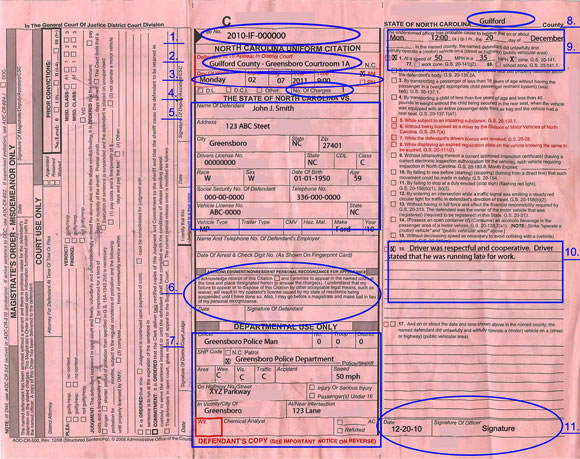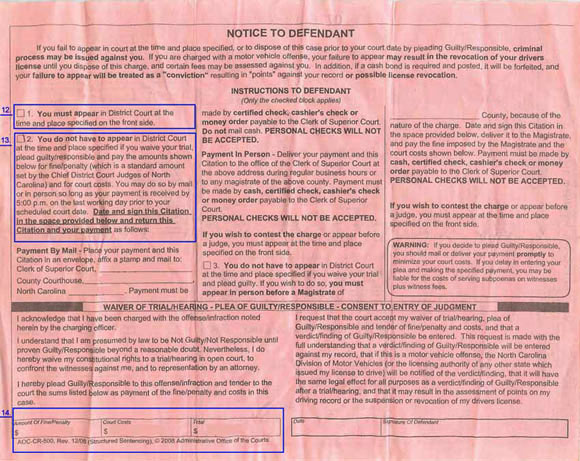How To Read Your North Carolina Speeding Ticket
Click Here to download this Guide
The following is a guide on how to read a North Carolina speeding ticket. In the example speeding ticket, we have either drawn a circle or square around each important portion of the speeding ticket. Next to each circle or square is a number. Below the sample speeding ticket is a numbered list which contains a description of the information contained in the corresponding circle or square.


Box 1 – This information is either the criminal or infraction number assigned to your speeding ticket. This number is not always given to you when the law enforcement officer issues you the ticket, so don’t be alarmed if this section is blank on your speeding ticket. However, if this number appears on your ticket, this will be your speeding ticket’s assigned number in the court system.
Box 2 – This box indicates the county courthouse and courtroom you or your attorney will need to appear in on your court date.
Box 3 – This is the time and date set for your court date.
Box 4 – This area indicates how many charges you received from the law enforcement officer. With speeding tickets, you typically are only charged with one charge, speeding. However, it is not uncommon for an officer to also charge you with other crimes, such as lack of insurance, invalid registration, or a seat belt violation.
Box 5 – This is where the law enforcement officer fills in all of your personal information and information about your vehicle. It is common, and permissible, for the officer to not fill in every box in this part of the speeding ticket. Also, you may notice that the officer made mistakes in filling in this information, such as a misspelling of your name. However, unless the officer’s error or omission is substantial, your speeding ticket will not be dismissed because of the officer’s mistake.
Box 6 – This is where you can sign the ticket, acknowledging that you received the speeding and promise to appear on your court date that is stated in box 3. It is common for officers not have you sign this portion of the speeding ticket. If the officer does not have you sign the acknowledgement, your speeding ticket is still valid and you or your attorney must appear on your court date.
Box 7 – First, the officer gives his or her identification information (typically initials and law enforcement agency). Second, the officer identifies what the scene of your speeding was like. The officer will indicate what the weather was like, what the visibility was, the overall traffic conditions, whether there was an accident, and what your speed was. Again, the officer may leave some portions of this part of the speeding ticket blank, and he or she may make some mistakes. But, unless the officer’s omission or mistake is substantial, your speeding ticket is not automatically dismissible.
Box 8 – This is the county where the law enforcement officer issued your speeding ticket. The county listed is where you or your attorney will be appearing on your court date. Also, the county listed here is important because the resolution of your speeding (what types of plea agreements are made available to you) may depend on your driving record in that county.
Box 9 – This area is probably the most important part of your speeding ticket. This area is where the officer actually states your specific speeding charge. The officer states the date and approximate time when you were pulled over, as well as the posted speed limit and how fast you were traveling. The officer will also check one of 3 boxes indicating what North Carolina General Statute he or she alleges you violated: (a) N.C.G.S. 20-141 (speeding), (b) N.C.G.S. 20-141(2) (speeding in a work zone), or (c) N.C.G.S. 20-141.1 (speeding in a school zone). If the officer makes a mistake in this part of ticket, such as writing down the wrong date, then you may be able to get your speeding ticket dismissed.
Box 10 – This is area is where the officer can write down any comments regarding the circumstances of your speeding ticket. It is common for the officer to leave this portion of the ticket blank.
Box 11 – This is the location where the officer signs and dates your speeding ticket. Depending on what county you were issued the speeding ticket, the failure of the officer to sign your speeding ticket may allow you to get your speeding ticket dismissed.
Box 12 – If the officer checks this box, then you or your attorney must appear on your court date that was described in box 3 (you are not allowed to just pay your speeding ticket and avoid court).
Box 13 – If the officer checks this box, then you have the option of paying your court costs and fine listed in Box 14, and not going to court. We almost never recommend signing the citation and paying the applicable fees/fine, because by doing so you are pleading guilty to your speeding ticket. By pleading guilty to your speeding ticket, you will almost always see an increase in your auto insurance rates, and, depending on your driving record, you may have your driver’s license revoked. Whether you hire an attorney or represent yourself, we never recommend that you just sign your citation and send in the applicable fees/fine.
Box 14 – in this area the officer will indicate what your fine will be and the applicable court costs associated with your speeding ticket.
Kreger Law Firm’s North Carolina Speeding Ticket Attorneys serve clients charged with speeding and other traffic violations in Durham County, Guilford County (including the cities of Gibsonville, Greensboro, High Point, Jamestown, Oak Ridge, Pleasant Garden, Sedalia, Stokesdale, Summerfield and Whitsett) and Orange County (including the cities of Carrboro, Chapel Hill and Hillsborough).
